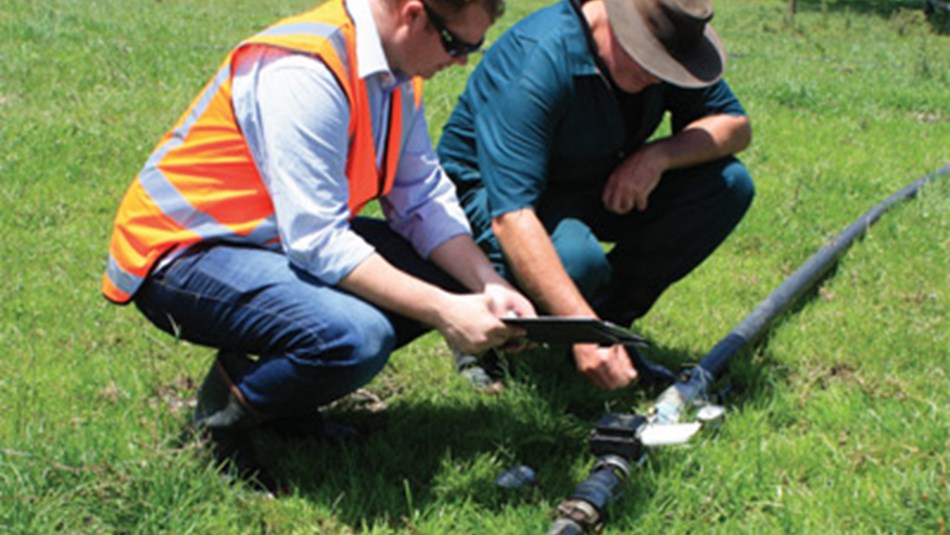WOF assessment highlights effluent issues
Dairy Exporter May 2018
Offering an independent top to tail assessment of a farm’s effluent system gives some of Dr Debbie Care’s clients an early heads up on upcoming issues, and for others peace of mind they are on track with effluent management.
Debbie has been assessing farms in New Zealand for over four years, and her work has covered the spectrum of systems, solutions and problems farmers encounter in the tricky business of sustainably managing farm dairy effluent.
“I am starting to see more viewing the Dairy Effluent WoF as a regular assessment that helps them determine if what they were doing three years ago is still valid now, and if not finding out what needs to be changed to keep it valid.”
For many of her clients the WoF is a ‘safe’ way to have the system assessed without fear of milk supply disruption or council regulatory action, should the system be found wanting.
The assessment is very thorough, taking up to four hours to complete and delivering a comprehensive report back to the farming client.
Physical assessment of the system involves measuring main line flows and pressure to check pump performance, and testing application depth and rate of the spray irrigator. Farm storage capacity is also assessed and calculated to allow for feed pad area, storage days and potential herd size.
She says importantly the assessment process does not only analyse and calibrate system components, but also looks closely at how personnel interact with the system.
“You can have all the best kit in the world, but the template for the WoF assessment acknowledges and takes account of the how well staff understand the system, and how they need to manage it –this is crucial on most modern larger dairy farms today.”
Her work assessing sometimes extends to return visits to take staff through different aspects of effluent management, such as ensuring irrigation sprinklers are operating properly.
The reports she delivers back to clients incorporate the “good, bad and ugly” of the system’s capacity, compliance and effectiveness. Debbie says this can sometimes result in difficult conversations, but ones that are best had to ensure the system’s faults are identified sooner rather than later.
“It’s a conversation far better to have in this context, than in the context of a regulatory framework, and it’s a constructive means of really looking at what can be done to avoid that regulatory expectation coming down hard on your farm business.”
The report is presented in an on-line QCONZ template that provides a verifiable, auditable proof of the system. The assessing process and reporting system have been well received by regional councils throughout the country.
“We have had clients who have had an issue with their system, and the council will ask them to get a WoF assessment. Getting a WoF done can also be a means of responding to a council directive about a farm effluent issue.”
With Farm Environment Plans becoming standard requirements nationally, the Effluent WoF fits in as one of the farm actions under the umbrella of the plan to deliver a sustainable operation, whilst also identifying potential risk areas that may need managing or investment.
For farmers beleaguered by company reps offering multiple solutions to their effluent problems, Debbie’s clients appreciate having an independent, fact based assessment before investing hard earned farm profit in new equipment.
“One client was told their irrigator needed replacing, but an assessment revealed the pump did not work as well as it should, and fixing that was a far cheaper solution. I may make a recommendation about what tool they may need, but won’t be recommending a brand and will advise clients on the right questions to ask when they are assessing brands.”
At a cost of little over $1000 to have an assessment completed, the payback in terms of more effective use of valuable effluent nutrients can be significant, and achieved well within the season it is conducted.
The comprehensive certification process to become a Dairy Effluent WoF assessor also gives farmers security the advice they receive is well founded.
Assessors are required to invest in pressure and flow metering equipment and attend a three day hands on course delivered by Hamilton based QCONZ. Once trained, QCONZ take prospective assessor through an assessment, observing procedure and practice in the field before granting certification.
With their “no surprises” approach to letting farmers know during the visit about any problem areas, Debbie says the assessment visit is a very mutual, constructive one, and more clients are making the visits part of a quarterly or yearly process, with action lists provided on any required changes.
“There’s been a big shift in farmer attitudes to effluent management, and the WoF has helped remove that regulatory fear when farmers want to determine how effective their system really is.”
With over 20 certified WoF assessors nationally visit www.effluentwof.co.nz to find one near your farm today.
Book a WOF with a certified effluent assessor

